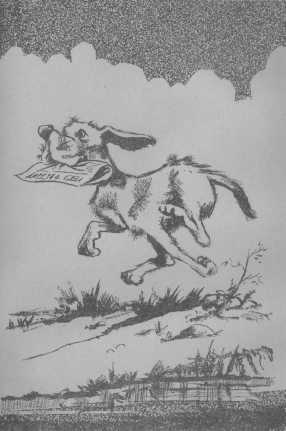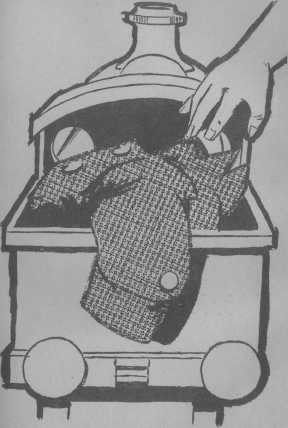Anytime Tales (11 page)

Still—she would go home. Perhaps her mother would know her even though she was now a pony. Matilda cried a few big tears out of her large pony-eyes. She cantered out of the gate that the children had carelessly left open, and went down the lane to her home. The door was open. The pony cantered inside—and there was her mother, laying the tea.

“Good gracious! A horse coming to tea!” said Matilda’s mother. “I never heard of such a thing! Shoo! Shoo! Go out at once.”
Matilda went right into the room and put her big pony-head on her mother’s shoulder. Tears ran down her big brown pony-nose.
“Well, look at this!” cried her mother in the greatest amazement. “A pony crying on my shoulder! Poor creature, what’s the matter?”
Matilda tried to get on to her mother’s knee, but of course, being a pony, she couldn’t possibly.
“Now, pony, don’t be silly,” said her mother, pushing it away. “Do you think you’re a little dog or something, trying to sit on my knee? You’ll be borrowing my handkerchief to wipe your eyes next! Dear, dear, I don’t understand this! I must be in a dream.”
A voice spoke from the doorway. “No—you are not in a dream. That is Matilda—but she stamped her foot at me, so I changed her into a pony for a time. Horses may stamp when they please, but not children!”
“Oh dear, oh dear!” cried Matilda’s mother, putting her arms round the pony’s neck. “Now I understand what this poor pony wants. Old woman, you are magic! Change my little girl to her own shape,
please!
I am sure she will never, never stamp her foot at you again!”
“Will you ever stamp your foot again, Matilda?” the old dame asked the pony. It shook its big head at
once. The old woman waved her hand—and lo and behold! the pony disappeared, and there was Matilda, looking rather small and scared.
“Good-bye,” said the old lady. “Remember that only horses stamp—so be careful you don’t change into one again. You never know!”
She went out, with her basket of blackberries. Matilda looked at her mother.
“Don’t let me stamp my foot any more!” she wept, glad to find that she didn’t neigh this time.
“Well, you must try and remember yourself,” said her mother. “I can’t tell your feet what to do!”
Matilda laughed through her tears. “I’ll try and remember,” she said. “I don’t want to eat grass any more—and you don’t want a pony stamping about the kitchen, do you, Mother?”
All the same, I hope I’m there if Matilda ever
does
stamp her foot again—it would be so surprising to see her change into a pony!

Mr. Chip the carpenter had a very exciting workshop. He was always making or mending all kinds of things and the boys loved to go and look at his tools. He had so many—hammers, saws, screwdrivers, chisels—and it was marvellous to watch the way he used them.
But Mr. Chip didn’t like the boys. “Little pests!” he called them. “Miserable little mischiefs! Rude little monkeys!”
So, of course, although the boys liked Mr. Chip’s shop they didn’t like
him.
They made up a very silly game just to tease him. The game was to dart into his shop and pick up some shavings from the floor before he could stop them. At the end of the week the boys each counted their shavings and the one who had the most was their leader for the next week.
“It’s a very silly game,” said Jack’s mother, when she heard of it. “And it will only make Mr. Chip angry.”
“But the shavings aren’t worth anything to him, and it’s fun to see who can get the most,” said Jack. “He shouldn’t be so cross and grumpy, Mother. He doesn’t even like us to watch him when he’s making something—and he’s really very clever.”
This silly game really made Mr. Chip very cross indeed—so cross that one day he bought a dog! It was only a puppy at first, but it would soon grow. “And I’ll teach him to fly at any boy who dares to come into my shop!” said Mr. Chip, hammering away.
The boys would have liked the puppy—and the puppy would have liked the boys—but Mr. Chip taught it to bark and fly at any boy who dared to dart into his shop to pick up a shaving. Soon the puppy could growl and show its teeth.
“One of these days that puppy will be a big dog, and will bite one of you,” Jack’s mother said. “It’s too bad of Mr. Chip to make it so fierce—I do wish you boys would stop teasing the carpenter. You make
him
fierce, too, and he’s not really a bad fellow at all.”
The puppy grew and grew. It adored Mr. Chip, and Mr. Chip thought it was the best dog in the world. He and the dog were always together, except when Mr. Chip sent it for his paper in the afternoon.
“Now, Wags—off you go for my paper,” he would say. And Wags would run out of the shop to the paper man at the corner, and bring back a paper in his mouth. The boys thought that was very clever of him. They were afraid of Wags now. He seemed as fierce as his master! It was quite dangerous to dart into the shop and pick up a shaving. Peter nearly got bitten!

“Horrible dog—and horrible master!” said Kenneth. “I’ve a good mind to throw a stone at Wags when he goes to fetch the afternoon paper for Mr. Chip.”
“No, don’t,” said Jack. “That would be a hateful thing to do.”
The boys found that the only safe time to dart into the shop and snatch up shavings from the floor was when Wags was out fetching the afternoon paper! But Mr. Chip was ready for them! He caught Kenneth by his collar and shook him till the boy was afraid bis teeth would fall out.
He caught Ned and rubbed his nose in a pile of sawdust. He nearly caught Jack, and bellowed so loudly at him that Jack dropped the shavings he had snatched up!
“Little pest! Wait till I get you!” he roared. “I’ll set my dog on you!”
Now Jack had a very big wooden engine, painted red. It wasn’t big enough for him to get into the cab, which was a pity—but it was quite big enough to take with him when he went shopping for his mother, because it could carry all the things he bought! He used to stuff them into the cab of his big red engine, and take them home like that.
The other boys thought it a grand engine. “Be grander still if it had trucks,” said Kenneth. “We could all go shopping together then for our mothers, and use a truck each for our parcels. That would make shopping fun.”
“Well, there’s only room for
my
shopping,” said

Jack, afraid that the boys might want to use his engine for all their parcels, too. It would be very heavy to pull then! “This kind of wooden engine doesn’t have trucks!”
The mothers all smiled to see Jack go shopping, pulling his big engine along empty first of all—and then going back with the cab piled high with all kinds of things. It was wonderful what that engine carried! It even managed to bring home half a sack of potatoes once.
One afternoon Jack’s mother called him. “Jack! Where are you? Oh, you’re there, reading. I’m so sorry, dear, but I quite forgot to ask you to take your blazer to be cleaned when you went shopping this morning. It won’t be back in time for the beginning of term if you don’t take it to-day. Will you take it now for me?”
“Right, Mother,” said Jack cheerfully. He really was a very good-tempered boy. He got up and went to fetch his engine.
“Oh, don’t bother to take your engine, just to carry your
blazer!”
said his mother. “Surely you can take it over your arm, Jack!”
“My engine likes a run,” said Jack. “It’s just like a dog.”
He pulled the big engine from its place in the hall cupboard, and stuffed the blazer into the cab. Then he hauled on the rope. “Come on,” he said. “We’ll hurry there and back, and then I can get on with my book.”
But something happened on the way there. Mr. Chip had sent his dog Wags out for his afternoon paper at just the same time that Jack was taking his blazer to the cleaner’s. Wags had gone to the man at the corner, dropped the money out of his mouth on to the pavement, and let the paperman stuff a folded paper between his teeth.

He turned to go back to Mr. Chip, when a much bigger dog growled at him. Wags growled back. The dog flew at Wags, and Wags leapt sideways into the road.
There was a loud squeak of breaks, and a car swerved suddenly. But it didn’t stop soon enough. It hit poor Wags on the back legs, and the dog crumpled up on the road with a howl. The paper fell from his mouth.
Jack was just nearby with his big engine, and he saw it all happen. The big dog ran off at once. The car-driver got out of his car, and two or three children ran up. Wags tried to get up but he couldn’t. His back legs were hurt.
“Who does this dog belong to? Does anyone know?” asked the car-driver.
“Yes. It belongs to Mr. Chip, the carpenter,” said Jack, coming up with his engine. “Oh, poor Wags! He’s hurt! He can’t get up.”
“I’ll go along in the car and tell Mr. Chip to come and fetch his dog,” said the driver, and he got into the car again. He drove off. But alas, he didn’t go to Mr. Chip’s. He drove straight past, and went on his way.
Jack waited and waited for Mr. Chip to come, but he didn’t. ‘Wags dragged himself painfully to the pavement, picking up his master’s paper in his mouth. Jack was very, very sorry for him.
“Wags!
I’ll
take you to Mr. Chip,” said the boy at last. “The car-driver can’t have told him. But how can I take you?”
